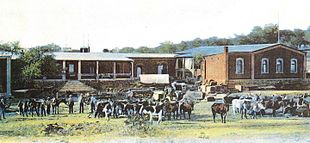Albert Voigts (politician)
Albert Voigts (* 1869 in Meerdorf ; † 1938 ) was a German farmer and member of parliament in German South West Africa and then in South West Africa .
Life
Albert Voigts came to the German colony of German South West Africa as a merchant at the end of the 19th century with his brothers Gustav and Richard . He traded with the Herero , an ethnic group who at that time mostly ran cattle. To this end, he founded the trading company “ Wecke & Voigts ” on September 3, 1892 in Windhoek with Fritz Wecke , who had been his employer until then .
As a farmer, he went down in Namibian agricultural history when he became the first breeder of Karakul sheep in South West Africa on his farm Voigtsgrund , the supplier of Persian skins . He received eight pure-blood nuts and one pure-blood ram from the then governor Friedrich von Lindequist from the experimental herd of twelve Karakul sheep that Theodor Thorer had placed with the government. The rest of the animals that were moved north did not thrive because of the humid climate there. As Voigts himself said, at first he had no inclination to breed these animals, which were completely unknown to him, and which also appeared ugly to him, he only did so as a favor to Governor von Lindequist. Voigts bought black African sheep from the farmers in the area, on the assumption that if you wanted to crossbreed, it would have to cross with black animals in order to get black lambs. Later it turned out that crosses with white animals also gave quite good results. As early as 1914, Voigtsgrund received the honorary award donated by the Thorer company for the best performance in karakul breeding at the Windhoek state exhibition. In the 1930s, the Voigtsgrund farm in the Gibeon district comprised approximately 70,000 hectares of property and two leased farms of approximately 30,000 hectares. Separate from the main block, there were also about 60,000 hectares of property. The family stock corporation, registered in 1937, owned a total of around 17,000 Karakul sheep.
For the resounding success and for a time even the western fur fashion dominating South West African Persians , especially in the German Federal Republic, the nationwide rebreeding to a flat, broad-tailed moiré hair type was decisive. This did not initially take place on Voigtsgrund, but in a government herd under the breeding director AD Thompson. The trade name for Persians from what is now Namibia has been Swakara since 1969 , and since 2012 this has also been the official name of the sheep breed (derived from Karakul in South West Africa).
Political career
In the elections for the South West African Legislative Assembly in 1926 , Voigts won the election for the German Confederation for South West Africa in the South West African Legislative Assembly in the constituency of Okahandja with 271 of 271 votes . The parliament elected him to the executive committee, the government of the mandate area. At the party congress on September 9, 1928 in Karibib , Albert Voigts was elected as the new chairman of the German Confederation and led the organization of the ethnic group of South West African Germans until the organization was banned in 1937.
literature
- Victor L. Tonchi, William A. Lindeke, John J. Grotpeter: Historical Dictionary of Namibia . 2012, ISBN 978-0-8108-5398-0 , p. 455.
- Walter Moritz: Ababis: experiences of an Albert Voigt. John Meinert Printing, Windhoek 1994, From old days in Südwest Heft 2, 2nd edition, ISBN 978-99916-30-42-7 .
Web links
- Newspaper article about Albert Voigts in the 20th century press kit of the ZBW - Leibniz Information Center for Economics .
Individual evidence
- ^ Hans Grimm: Gustav Voigts - A life in German Southwest , 3rd edition, Bertelsmann-Verlag; Gütersloh 1942, p. 13.
- ↑ a b c Joachim Langlet: The Karakul sheep breeding in South West Africa . In: G. Frölich (Hsgr.): Basics of Karakul fur sheep breeding . Paul Parey publishing house, Berlin 1938; Pp. 205 ff, 247-248.
- ↑ Without information on the author: In: SWA Persianer . - 1908-1958. With this brochure, the Marientaler Exhibition Association is celebrating the fiftieth anniversary of the Karakul economy in South West Africa . - The first karakul farmer from the southwest . Sources: J. Langlet, L. Voigts, pp. 16–18 - The Thorer's share in the development of the Karakul economy in South West Africa . Pp. 31-33.
- ^ Fritz Wertheimer : From German parties and party leaders abroad. 1927, p. 235 ff.
- ^ Report of the Administrator of South West Africa for the year 1926, p. 4.
| personal data | |
|---|---|
| SURNAME | Voigts, Albert |
| BRIEF DESCRIPTION | German farmer and politician in South West Africa |
| DATE OF BIRTH | 1869 |
| PLACE OF BIRTH | Sea village |
| DATE OF DEATH | 1938 |


